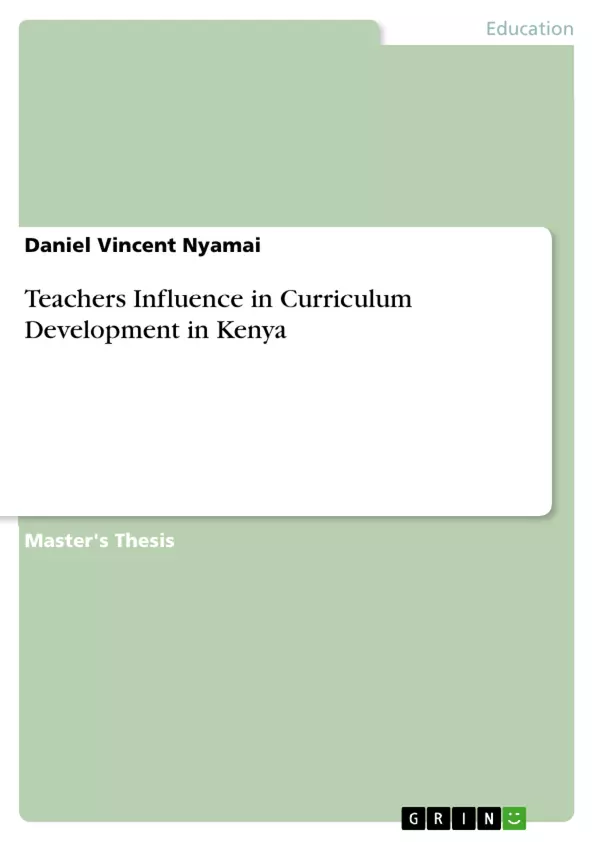This study is about the influence of teachers on curriculum development in Kenya. Previous studies have shown that teachers, as primary stakeholders of the curriculum, are the key implementers of the developed curriculum. Not much is known about their influence in the development of the national curriculum. The study investigates the current level of teacher involvement in curriculum development through analysis of case studies conducted in Kenya in regards to teacher participation in curriculum development in Kenya. Further, the study investigates how the local curriculum governing body, Kenya Institute of Curriculum Development (KICD), can ensure the full participation of teachers in curriculum development.
Inhaltsverzeichnis (Table of Contents)
- CHAPTER 1: INTRODUCTION
- 1.1 Conceptual framework and background to the study.
- 1.2 Rationale of the study..
- 1.3 Purpose of the study..
- 1.4 Research aims and objectives
- 1.5 Research questions....
- CHAPTER 2: LITERATURE REVIEW...
- 2.1 Introduction.
- 2.2 Curriculum development in Kenya..
- 2.3 Reasons for Curriculum Development ......
- 2.4 Motives for Teacher Involvement in Curriculum Development .......
- 2.5 Conclusion......
- CHAPTER 3: RESEARCH METHODOLOGY.
- 3.1 Introduction.
- 3.2 Research design.....
- 3.3 Sampling strategy..
- 3.4 Data Analysis .........
- 3.5 Ethical considerations to secondary research..
- 3.6 Justification of Data collection method.....
- CHAPTER 4: RESULTS AND FINDINGS.
- 4.1 Introduction ........
- 4.2 Analysis of Case Studies
- 4.3 Summary
Zielsetzung und Themenschwerpunkte (Objectives and Key Themes)
This study investigates the influence of teachers on curriculum development in Kenya, particularly focusing on the level of teacher involvement and the potential for greater participation. It explores how the Kenya Institute of Curriculum Development (KICD) can promote the full engagement of teachers in this process.
- Teacher involvement in curriculum development in Kenya
- The role of the Kenya Institute of Curriculum Development (KICD)
- Models of teacher participation in curriculum development
- Teacher empowerment and its impact on curriculum development
- The influence of teachers on school governance
Zusammenfassung der Kapitel (Chapter Summaries)
Chapter 1 provides an introduction to the study, outlining the conceptual framework, rationale, purpose, research aims, and objectives. Chapter 2 delves into the literature review, exploring curriculum development in Kenya, reasons for curriculum development, and motives for teacher involvement in this process. Chapter 3 outlines the research methodology employed, including the research design, sampling strategy, data analysis, ethical considerations, and justification for the chosen data collection method. Chapter 4 presents the results and findings of the study, analyzing case studies to understand the level of teacher involvement in curriculum development. The chapter concludes with a summary of the findings.
Schlüsselwörter (Keywords)
The research focuses on the key areas of curriculum development, teacher participation in curriculum development, teacher empowerment, and the role of teachers in curriculum development. The study also examines the importance of the Kenya Institute of Curriculum Development (KICD) in promoting teacher involvement in this process.
Frequently Asked Questions
What is the main focus of the study on curriculum development in Kenya?
The study focuses on the influence of teachers in the national curriculum development process in Kenya, investigating their current level of involvement and identifying ways to increase their participation.
Why are teachers considered primary stakeholders in the curriculum?
Teachers are considered primary stakeholders because they are the key implementers of the developed curriculum at the classroom level.
What is the role of the KICD in this process?
The Kenya Institute of Curriculum Development (KICD) is the local governing body responsible for curriculum development and is the entity that can ensure and promote full teacher participation.
What research methodology was used in this study?
The study employed a secondary research design involving the analysis of case studies regarding teacher participation in Kenya.
What are the key themes explored in the research?
Key themes include teacher empowerment, models of participation, the role of the KICD, and the impact of teachers on school governance.
How does teacher empowerment affect curriculum development?
The study explores how empowering teachers leads to more effective curriculum development and implementation by utilizing their practical expertise.
- Quote paper
- Daniel Vincent Nyamai (Author), 2020, Teachers Influence in Curriculum Development in Kenya, Munich, GRIN Verlag, https://www.grin.com/document/1175810



